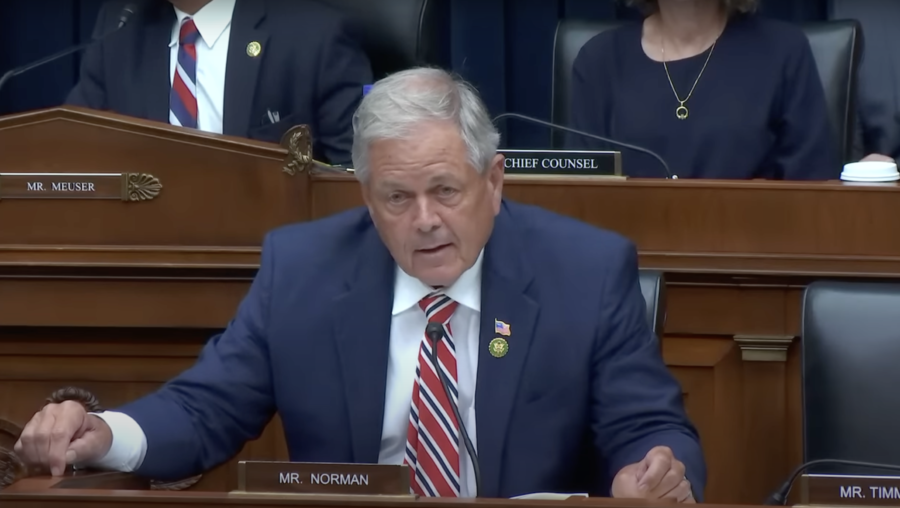New research reveals that both House Republicans and the witnesses they’ve called to kick off “ESG month”—a series of GOP-led hearings in July intent on preventing companies from responding to the climate crisis—have deep financial ties to the fossil fuel industry.
Republican members of the House Financial Services Committee, which called for the hearings, have accepted more than $6.6 million from the oil and gas industry, according to a new report by the Congressional Integrity Project. In addition, some committee members have direct financial stakes in oil and gas companies, and their witnesses work at think tanks bankrolled by fossil fuel interests.
The hearings this month will culminate in the introduction of bills written to limit the ability of fiduciaries to consider environmental, social and governance factors—also known as ESG—in making investment decisions. Avoiding any acknowledgement of the true economic impact of climate change is a key demand of the fossil fuel industry.
The Republican backlash against ESG investing is part of a larger manufactured crisis around “woke capitalism,” a conservative rallying cry that 2024 GOP presidential hopefuls like Ron DeSantis and Vivek Ramaswamy are hoping will win them the Republican nomination.
Extensive reporting continues to reveal the deep ties between anti-ESG advocates and the fossil fuel industry. The Center for Media and Democracy (CMD) website SFOF Exposed documents how a group of state financial officers—GOP state treasurers and auditors—coordinate with right-wing organizations and operatives to both back and profit from the fossil fuel industry and lend anti-ESG legislation institutional legitimacy.
House Republicans presiding over the hearings “have taken over $9.6 million in campaign contributions from four industries commonly included in ESG screens, namely the oil & gas, coal, tobacco, and civilian firearm industries,” the report states.
Six House Republicans on the committee have reported that they have direct financial interests in the oil and gas industry, according to the most recently available mandatory financial disclosures reviewed by CMD.
Representatives French Hill (R-AR), Ralph Norman (R-SC), John Rose (R-TN), Pete Sessions (R-TX), and Roger Williams (R-TX) all reported having investments in fossil fuel giants such as Chevron, ExxonMobil, Continental Resources Inc., and Halliburton.
In his June 2023 filing, Sessions reported having fossil fuel assets with an estimated value of between $19,005 and $110,000 (the financial disclosure form calls for asset values to be reported within set ranges). Hill estimated his oil and gas royalties to be worth between $15,001 and $50,000, the same range for Norman’s holdings in Halliburton. Another committee member, Rep. Mike Lawler (R-NY), disclosed his lobbying activities for New Yorkers for Affordable Energy, an oil industry front group.
In addition, CMD has found that most of the GOP members of the House Financial Services Committee have received significant campaign contributions from AIPAC. This pro-Israel lobby has doggedly fought the boycott, divest, sanctions (BDS) movement and provided the intellectual framework for opposing fossil fuel divestments.
Paid Testimony
Republican witnesses at the first hearing on Wednesday included representatives from the Manhattan Institute and the American Enterprise Institute (AEI), two conservative think tanks that have accepted significant funding from the fossil fuel industry.
James Copland, author of the book The Unelected: How an Unaccountable Elite is Governing America (2020), is a senior fellow at the Manhattan Institute and director of its legal policy department. In a 2022 comment letter to the Securities and Exchange Commission (SEC) opposing its proposed climate disclosure rules, he accused the agency of developing “illegal and unconstitutional” rules for nefarious purposes.
“The proposed rule has its roots in pressure from elite asset managers who wish to manipulate the capital market system to force companies to align their behavior with the political preferences of the elites,” Copland wrote.
Since 2001, the Manhattan Institute has received more than $3 million in funding from foundations tied to Koch Industries.
As a law student, Copland was an Olin Fellow in Law and Economics, benefitting from a scholarship program named after the Olin Corporation, a global chemicals and ammunition manufacturer, with the goal of training conservative legal and economics professionals.
Benjamin Zycher, another witness at Wednesday’s hearing, is a senior fellow at AEI, an anti-regulation think tank that received $100,000 from ExxonMobil in 2021, as reported by Kate Aranoff in The New Republic. In 2007, during the George W. Bush administration, AEI paid scientists to dispute the first report by the UN’s Intergovernmental Panel on Climate Change. At the time a Greenpeace spokesperson called AEI “the Bush administration’s intellectual Cosa Nostra,” adding that the think tank represents “White House surrogates in the last throes of their campaign of climate change denial. They lost on the science; they lost on the moral case for action. All they’ve got left is a suitcase full of cash.”
Among the trustees on AEI’s board are Harlan Crow, the billionaire Republican donor who has been lavishing Supreme Court Justice Clarence Thomas with gifts of real estate, private school tuition, and luxury vacations for decades, and Kimberly Dennis, president and CEO of the Searle Freedom Trust.
“I’m really incredibly taken aback,” said Rep. Rashida Tlaib (D-MI) at the hearing, referring to ExxonMobil’s financial support of AEI.
On Thursday, the committee heard from the vice president for policy at the National Association of Manufacturers, an industry megagroup with a 130-year history of opposition to regulations of any sort, and a senior advisor from the Bipartisan Policy Center, a think tank that received $200,000 from ExxonMobil last year.



Leave a Reply